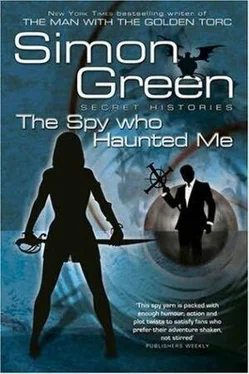Not least because if we did stop, I wasn’t sure all of us would be able to find the strength to start up again. Real cold is constant and unforgiving, and it kills by inches when you aren’t looking.
After a while, I realised Honey had moved forward to trudge along beside me. I raised my head just a little to look at her. Honey’s coffee skin had gone gray from the cold, and her eyes had a flat, exhausted, hurting look.
“Why aren’t you wearing your armour?” she said abruptly. “Then you wouldn’t feel the cold.”
“I chose not to,” I said. My mouth was so numb I had to concentrate on carefully forming each word. “Because . . . we need to work as a team. Working together, striving together. As equals, respecting each other. Because if we’re a team . . . maybe we’ll stop killing each other.”
“You didn’t believe Katt’s and Blue’s deaths were accidents for one minute, did you?” said Honey.
“No. You?”
“Of course not. I’m CIA. We’re trained to see the worst aspect of any situation and plan accordingly. And you heard the Independent Agent. Only one of us can return to claim the prize. Killing each other off was inevitable at some point.”
“Killing is never inevitable,” I said roughly. “I’m an agent, not an assassin.”
Honey shot me a heavy glance from under iced-up eyelashes. “You really think you can keep this group from each other’s throats?”
“Of course,” I said. “I’m a Drood. I can do anything. I have it in writing, somewhere.”
“You could put on your armour,” said Honey. “Run ahead to the city and send back help.”
“No telling how long that would take,” I said. “Or how many of you would still be alive when I got back.”
“You can’t worry about all of us.”
“Watch me.”
She chuckled briefly. “You’re a good man, Eddie Drood. How you ever got to be a field agent is beyond me.”
“I bribed the examiner.”
We strode on, fighting for every step and every breath, forcing our slowly dying bodies through the dead forest. I lost track of time. The sun seemed always overhead, the shadows never moved, and every part of the forest looked just like every other part. No landmarks, nothing to aim for, nothing to mark distance passed. We were all close to failing, the last of our hoarded strength draining away, only willpower and brute stubbornness keeping us going. No one complained, or cursed, or asked for help. We were, after all, professionals.
I could have armoured up. Gone on, and left them behind. But I couldn’t do that. Someone had to lead this group by example, and unfortunately it looked like it was down to me. Considering how much trouble I always have with authority figures, it’s amazing how often I end up being one. Sometimes I think this whole universe runs on irony.
And then, long after I’d reached the point where I just couldn’t take any more and couldn’t go on, and did anyway, the trees fell back and I stumbled to a halt at the top of a long gentle slope leading down to a city in the middle of a wide-open plain. There wasn’t much to see: just high stone walls surrounding blunt and functional buildings. Not much bigger than a decent-sized town, really, with only the one road leading in and out. Could have been any place, anywhere. No traffic on the road, no obvious signs of life. Could we have come all this way across a dead land just to reach a dead city?
It didn’t matter. It was shelter. And the mood I was in, I’d burn the whole place down just to build a fire.
The others crowded in beside me, looking down at the city on the plain, too cold and numb and exhausted to ask even the most obvious questions. I started down the gentle slope. No point in arguing anyway. There was nowhere else to go.
We followed the only road to the main gate set deep into the towering wall. The brickwork was seriously weather-blasted, but it still stood firm and strong, which was more than could be said for the massive main gate. Something had torn the gate right off its hinges and left it lying on the cold featureless ground outside the boundary wall. It could have happened yesterday or years ago. There was no way of telling. Inside the towering walls, the city lay still and open and utterly silent. The streets were deserted, with no signs of life in any of the buildings and not a sound anywhere of men or machines. A brief Cyrillic inscription had been carved deep into the stone above the gateway.
“Cyrillic!” said Walker. “We’re in Russia! Anybody read Cyrillic, by any chance?”
“I do,” said Honey.
“Of course you do,” I said. “Know thy enemy. Well, what does it say?”
“Probably Abandon all hope, ye who enter here, ” grumbled Peter.
“Well,” said Honey, trying to frown with her frozen forehead. “I can read one letter and two numbers. X37.”
“Oh, shit,” I said.
“Somehow it always sounds so much worse when he says it,” said Walker. “What’s wrong, Eddie? Are we to take it you know of this place?”
“If there was anywhere else to go, I’d go there,” I said. “Running. I know this city’s reputation. I know what it is and what it was for, and we shouldn’t be here.”
“I want to go home,” Peter said miserably.
“Russia,” Honey said thoughtfully. “I have contacts here, if I can just find a working comm system . . . What’s so bad about this place, Eddie?”
“Who cares?” said Peter. “It looks warm.”
“This is one of the old secret Soviet science cities,” I said. “Abandoned years ago. X37 means we’re in Tunguska territory, in northern Siberia.”
“Wait a minute,” said Peter. “As in, the Tunguska Event of 1908? That must be what we’re here for!”
“I hope so,” I said. “There’s a mystery in X37 too, but I really don’t think I want to know what it is. X37 was a bad place where bad things happened, and just maybe they still do.”
“It offers shelter and the possibility of warm clothes and food,” said Walker. “First things first.”
And so we became the first people to enter X37 for many years, lambs to the slaughter, walking its empty streets looking for a suitable store to break into. To keep all our minds off the cold and to keep the others from asking too many questions about X37 just yet, I did my usual Drood font-of-all-knowledge bit and filled them in on what I knew of the great Tunguska Event.
In 1908, at 7:17 a.m. on the 30th of June, something hit northern Siberia with enough force to shake the world. There was a huge explosion in the remote and largely uninhabited territory of Tunguska, later estimated to be between ten and twenty megatons—more powerful than any nuclear bomb ever exploded. The force of the explosion felled some eighty million trees, uprooting them and knocking them flat over a range of eight hundred and thirty square miles. The light generated by this impact was so bright and lasting that men in London were able to read a newspaper in the street at midnight.
But the event wasn’t properly investigated until some twenty years later. The First World War and the Russian Revolution got in the way, and the Soviet authorities consistently refused all offers of outside scientific help. In 1928, a team of Russian scientists made the long and difficult journey into the frozen heart of northern Siberia, to investigate, and that’s when the mystery began. Because what the scientists found there made no sense at all.
Everyone’s first thought was that a really big meteor had finally made its way down through the atmosphere and struck us what should have been a killing blow, but there wasn’t any crater. Nothing. Not even a dent in the ground. So it couldn’t have been a meteor. Next thought: a comet. Since comets are mostly composed of ice and gas, it was just possible that a really big comet had made its way down through the atmosphere and exploded at ground level. Such things had been known to happen, on a much smaller scale. But in every such case, the exploding comet had driven certain identifying chemicals and elements into the ground, and there weren’t any at Tunguska. So, not a comet.
Читать дальше












